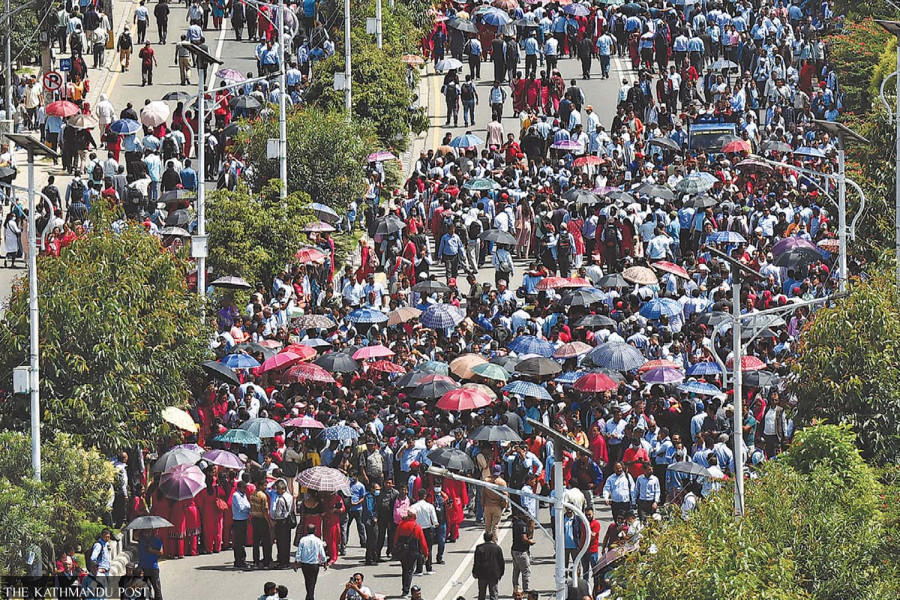National
Competing demands make it hard to end teachers’ strike
As local governments claim oversight of schools, teachers fear it will harm their prospects.
Binod Ghimire
Finding a resolution to the school education bill doesn’t appear easy for the government as various groups are in protests with contradictory demands.
Teachers from community schools across the country have descended on the Capital and have been staging protests starting Wednesday. From Thursday, they started halting the teaching-learning process at public schools, objecting to the bill, which proposes transferring the teacher management responsibilities to local governments.
As many as 282,585 teachers from public and private schools in total are opposed to the bill’s new provisions. While studies in most of 29,000 public schools across the nation have been halted, most private schools were open on Thursday. Private school teachers who have been demanding pay and other benefits at par with their public school counterparts have threatened to close schools if the government continues to ignore their demands.
The government and the agitating teachers on Thursday evening held the first round of dialogue, which ended inconclusively. Both sides have agreed to sit again Friday.
Nepal Teachers’ Federation is particularly dissatisfied with the bill’s provision allowing local units to recruit, transfer and demote or promote teachers. The federation has been saying the teachers want to remain under the aegis of the federal government, as being under the local government could jeopardise their jobs.
The agitating teachers want an immediate revision to the ‘problematic’ provisions of the bill. “We are not going to give up [on our protest] without concrete results this time,” Laxmi Kishor Subedi, general secretary of the federation, told the Post. “More of our friends will come to Kathmandu for the protest if needed.”
Protesting teachers argue that there will be no job security if the responsibility of managing teachers is given to local governments. Last year, the government signed a deal with the federation, agreeing to keep public school teachers under the federal government.
The umbrella bodies of local units also have reservations over the bill, mainly over reviving the district-level Education Offices and naming the bill as ‘school education bill’ instead of ‘federal education bill’.
Contrary to the demands of the agitating teachers, local units say it is their constitutional authority to oversee the entire school education system, including teacher management.
“The demands of the teachers’ federation are unconstitutional. They contravene Schedule 8 of the constitution which says basic and secondary education falls under the remit of local governments,” Laxman Bahadur Shahi, vice-chair of the National Association of Rural Municipalities Nepal, told the Post. He said they won’t allow any curtailment of local units’ authority enshrined in the constitution.
Schedule 8 of the constitution has listed the powers of local units and point number 8 of the list states that basic and secondary education falls under the jurisdiction of the local government.
The umbrella bodies of rural municipalities and municipalities, issuing a joint statement, have warned that they will vehemently oppose any provisions in the bill that trample on their constitutional rights.
“We request the teachers to give up their unconstitutional demands,” Shahi said. “That doesn’t mean we are against their genuine demands related to job security, pay and perks, and career development.”
In its 18-point demand, the federation has asked for pay and perks at par with civil servants, prospect of promotion and opportunity for all temporary teachers to compete in internal competition for permanent positions.
But the bill envisions that only half of the temporary teachers will be allowed to participate in internal competitions. And it doesn't guarantee any benefits for those who don't qualify in the competition. The agitating teachers are demanding golden handshakes for such teachers.
Education experts say dialogue is the only way out. “While some demands are not in line with the constitution, others are genuine,” Pramod Bhatta, a researcher on school education, told the Post. “Conflicting demands from different quarters make it difficult to find a solution acceptable to all dissenting parties. However, dialogue is the only way out.”
The National Campaign for Education, an umbrella body of over 300 non-governmental organisations working in education, has also opposed the bill saying it promotes commercialisation and privatisation of school education. It says the private schools must be converted into trusts as recommended by the High Level Education Commission in 2019. The private schools operators, however, have been strongly objecting to the recommendation.
He said he doesn’t think teachers would have a problem dropping some of their unconstitutional demands. The government has said it is ready to address every concern that doesn’t contradict with the constitution and that doesn’t add financial burden to the government.
“We are already in dialogue with the agitating teachers. The government is ready to address their demands if they are in line with the constitution and don’t add financial burden to state coffers,” acting Prime Minister and Minister for Defence Purna Bahadur Khadka said at the Nepali Congress Central Committee meeting while briefing party leaders about the ongoing protest of the teachers and initiatives taken by the government.
Different political parties and constitutional agencies have also urged the government and the agitating teachers to find an amicable solution through dialogue. Issuing a statement on Thursday, the National Human Rights Commission said peaceful protest is the constitutional right of every individual but that should be exercised without hampering the rights of others. “The teachers’ protest by closing down schools has hampered the children’s right to study,” said the constitutional human rights watchdog.
Similarly, the Rastriya Swatantra Party urged the agitating teachers not to deprive schoolchildren of their right to education.
In a statement, Mukul Dhakal, RSP’s general secretary and spokesman, said the party supports the teachers’ demands related to professional development but they should seek an alternative to schools closure.




 13.12°C Kathmandu
13.12°C Kathmandu














